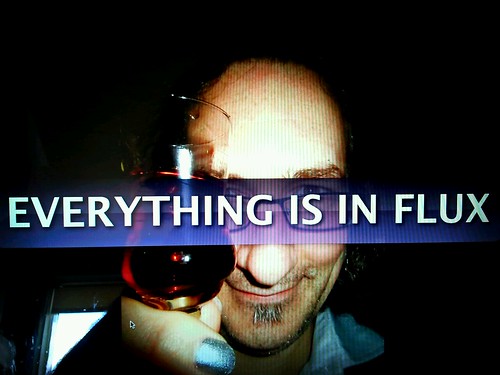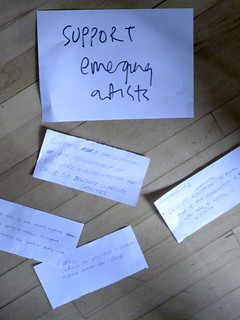Right, if you’ve been living underground for the last few days, you’ll have missed first this blog post by an intern at NPR and then this response by singer/songwriter and college lecturer David Lowery.
I sadly don’t have time to go through Lowery’s post point by point. Despite how widely it’s been distributed, I don’t, in all honesty think it warrants that level of scrutiny. I also really like this response from Erin McKeown. If you can’t be bothered wading through 1800 words from me on the subject, just read Erin’s post. It’s better than mine anyway.
That said, I did end up posting quite a bit about the points raised on Facebook, in a series of comments, so I’ve pulled those together here. They’re incomplete as a response, and ignore a lot of what I either agree with or most vehemently disagree with in both the original posts. But I thought they might add something to the discussion for those of you who visit here. (if you’re new here and want to take me to task over any of my thinking, it may be worth you having a read through some of the posts in the New Music Strategies category here, in case I’ve already addressed your point. It may also be that I’m wrong, or I’ve missed the mark. It happens from time to time.)
So anyway, the first thing I wrote on facebook was this slightly withering comment…
“I need to stop reading people’s comments on the Lowery piece. The egregious self-interest & entitlement of musicians is clouding their judgment ..so many aren’t even talking about what’s best for “musicians” across the board, but seem to be just carving out a supposed moral case for the continuation of their own pre-millennial biz model. And the constant conflation of people sharing infinitely-replicable-at-zero-cost digital files with theft from a shop is pre-teen economics. The value in music isn’t in the number of instances of a particular digital file that exist. We’re talking about a whole other paradigm, which brings together the economics of ubiquity with the need for a conversation about value and sustainability between artists and audiences that doesn’t put all the emphasis on ‘making music listeners feel so bad about getting shit for free that they pay out of guilt’. That, my friends, is an argument destined to fail.”
But then I was asked by another thoughtful, lovely friend what I thought of the Lowery piece, so I put together my first collection of thoughts:
“I think he’s partly there, but I think he’s missed the glaring unspoken point in her post which is that she works in radio (first college radio, now NPR) – of course she expects to get music for free! The only difference to the last 40 years is that she’s copying it rather than getting record company reps to give her endless freebies which are then charged to the artist. She has no real right speaking for ‘her generation’ in terms of who spends what and why. So her piece is so poorly written and incomplete that his take-down is overly long and addressed at a load of stuff that she was in no position to assert. The takeaway from her personal story, for me, is more one about how file sharing amongst people in ‘the industry‘ could save musicians a fortune, compared to the old school PR currency of CDs swapped between record label, PR, radio, magazine and gig promo people… When I was a journo I was constantly being given CDs, and the artists who were paying out of their advance for me to have them certainly were never consulted over whether I should have all those CDs…
I’m also uncomfortable with the slightly hectoring moral tone of Lowery’s piece – all that stuff about Artist’s rights and the obligation we have to them. That strikes me as a deeply unproductive dead end to go down in a conversation about the value of soundtracking someone’s life. There’s no inherent value in just ‘music‘ (see previous post of mine here) – great music is priceless, bad music is worthless. Telling me that it’s worth $10 for 50 minutes of it, without even asking me what I think of that particular bit of music is nuts. A CD was “worth” that because of the production cost and the nature of scarce economics in the manufacturing industry. If I make a thing, or if loads of us make similar things, we can set the price nationally or even globally to try and game the market and bypass people trying to undercut us. It also worked because of the point above about the variable value of music – we’d pay whatever it cost for the music that we REALLY loved…
But even then, some CDs were twice that $10 norm, and others were $1. Some of my favourite albums are ones I bought for 50¢ in a store in LA… I don’t value them less cos they were cheap… the fact that I bought them legally didn’t make the artist any more money than if I’d copied them from a radio station catalogue or been sent them by a PR…
So, yeah, I think Lowery is about 15-20% there, but his judgement is apparently clouded by his own fondness for his earlier career (in which he was one of the tiny few who made any sensible money) and some egregious self interest (musicians are pretty low on the list of workers that are being treated like shit in the current economy, given just how fun the job is that we’re doing for not much money…)”
Then, in response to a reposting of my first comment, someone brought up the other factors that have influenced changes in music sales patterns – a really important point, and I responded thus:
“Your point about other factors is SO important. The biggest shake-up is the stat about sales of ‘physical entertainment media’, including CDs, DVDs and video games. They were still rising when the last study I saw was done, but music’s chunk of it was reducing rapidly. $10-15 for a CD just doesn’t look like a good deal alongside 50 episodes of House in a pretty boxed set for about twice that. Ditto a computer game that will take over your life for the next three weeks…
Also worth looking at is the peak and subsequent tail in the sales of ‘legacy’ CDs. The peak in people replacing their LP and cassette collections on CD was some time in the late 90s, and then it went into free-fall. A MASSIVE part of the drop in CD sales is due to everyone who wanted the Eagles/Led Zep/Fleetwood Mac/Yes stuff on CD having already bought it and having no reason to buy it again, no matter how many times it was remastered. That’s why they keep reformatting (DVD-A, SACD, Minidisc, DAC etc…) because so much of the major label recording industry’s money comes from milking their archive, not on current artists.
For those of us who would NEVER have fitted in the old system, the internet is a lifeline. I’d never have had a career as a solo bassist without it, would never have played in Europe or the US, would never have sold thousands of CDs and downloads, and never met so many incredible musicians and music lovers from all over the world, connected by the shared wonder at what’s now possible.
Add to that the cost of making records being approx one order of magnitude cheaper than it was 20 years ago for equivalent quality, and you’ve got yourself an INCREDIBLE opportunity for art, innovation and community to form. Make friends with your listeners and all the supposed ‘problems’ of file sharing will answer themselves.
In the same thread, another musician took me to task about my line about self-interest and entitlement, and I responded:
The self-interest and entitlement isn’t that they want to get paid, it’s that so many are talking as though they have a deeper moral right to get paid in a specific way than anyone else doing any other job on the planet. The problem with the notion of ‘moral rights’ is that legislating them is nigh on impossible without trampling on someone else’s perception of morality. So unless you’re going to dismantle the free market (which I’d be largely in favour of, but certainly not because of anything to do with musicians), it’s logically perilous to be arguing for some kind of artisan class who deserve their own specific kind of creative economy where the ubiquitous manifestation of our documented art is treated differently from any other part of ubiquitous economics (as opposed to the scarce market in CDs/vinyl/t-shirts/gig tickets/posters/meet ‘n’ greets/lessons/etc. which still functions by the same old rules, except it now has to be more entertaining and meaningful that youtube to be worth paying for…)
It’s also not an either/or kind of self-interest. demanding anything for free is bullshit. I don’t have a ‘right‘ to get paid, but no-one else has a ‘right‘ to hear my music either. It’s all negotiated. I’m lucky to get to make music, even luckier to be able to make it available for people to hear without having to go cap in hand to some marketing dickhead at a label who’d tell me to be more ambient so they can sell it to new age radio. And I’m beyond blessed to have an audience of friends and soon-to-be friends who see fit to express their gratitude to me for making music that means something to them by paying for it. If I tried to force them to do that before they got to hear it, or put a time limit on their discovery process, it’d lose all it’s transactional power. Their freewill is what makes the exchange so meaningful for both of us. And no-one who’s downloaded my music for free has ever cost me a cent. That’s amazing – free listeners! wow.
After all that, I posted one more status update on facebook, this time about Bandcamp, in the light of this discussion:
So, while half the internet is freaking out over the idea that no-one ever pays for music anymore, Bandcamp are about to go past $20,000,000 – proper Dr-Evil-Pinky-In-The-Corner-Of-The-Mouth stuff. Why? because that’s 20 Million that doesn’t include anyone on a major label, and pretty much no-one who’s on a big indie. No one artist has made a million bucks on there yet (as far as I know!) and for a lot of the artists there, it’ll be the first time they’ve made *anything*. That’s a pretty hefty cash injection into the grassroots music economy. From a service that only makes *its* money when we do – no ad funding, no selling all-you-can-eat download accounts to fans. Just a seriously great platform for distributing, selling, discovering and sharing music. It is, in short, the absolute bollocks.
So there you go, an incomplete, but hopefully useful collection of thoughts on the discussion. If you’ve got this far, go back to work, you’re about to get fired for slacking off…




Excellent. I particularly like your last few paragraphs. Same as you, my musical ‘career’ could not have existed under the old regime and I also find Bandcamp to be the canine danglies. History may repeat itself but it never goes backwards – the future is open to being whatever we, the musicians, make it.
Thanks for this post, Steve – it’s good to hear a sane voice in the midst of all the hullabaloo.
It’s been hard to cut through this one because both Lowery and White raise some good points. As usual, no one person seems to have the complete handle on it, and they seem to be talking past one another to some extent.
This wave of chatter will crest and fall, as it always does; and in the meantime, I agree with Vince’s comment above: “the future is open to being whatever we, the musicians, make it.”
I sometimes wonder if people really believe that bitching and whining on the Internet is a legitimate substitute for just doing “The Work” of being a professional artist..
It’s not that mysterious.
Steve, I agree with the points you make here.
Also, isn’t it great that the young lady in question actually took the time to rip most of the 11,000 songs from CDs, which probably means she has listened to the majority of them! Someone with such an interest in music should be supported, not patronised as Lowery does. Her honesty is also refreshing.
I do hope that Erin has not been put off enjoying music, and turned to something less likely to garner negativity – playing video games.
So help me I read Lowery’s article – and then presumably because I thought there had to be some kind of counter argument – I read just about all of the comments and even commented myself. Reading your collected comments was like a breath of fresh air – positive and inspiring – I feel much better now, really. And I like the aside about dismantling the free market.
An excellent well argued, articulate article, especially when compared with the patronising bullshit from David Lowery.
My own take on what Emily White wrote is that she is naïve and simplistic.
Tedious and time-wasting as it was, I spent half of today reading through what David Lowery had written. It was not difficult to demolish.
http://keithpp.wordpress.com/2012/06/21/free-music/
Pal, I like what you wrote far more than Erin McKeown’s. Thanks for not pulling any punches. I’ve seen that most words on the topic are on the opposite side of the fence, and appreciate your typical boldness in sharing what you really feel.